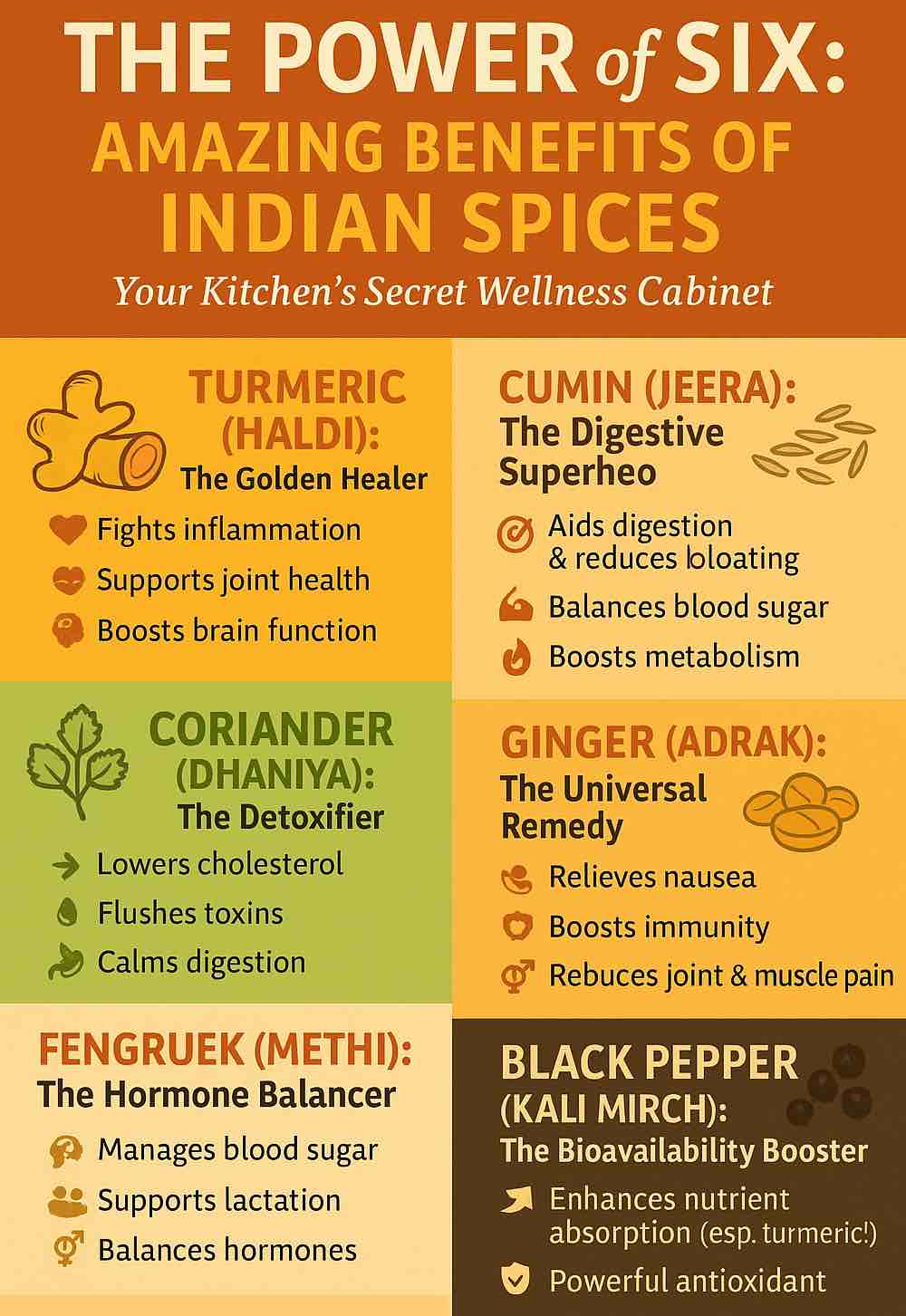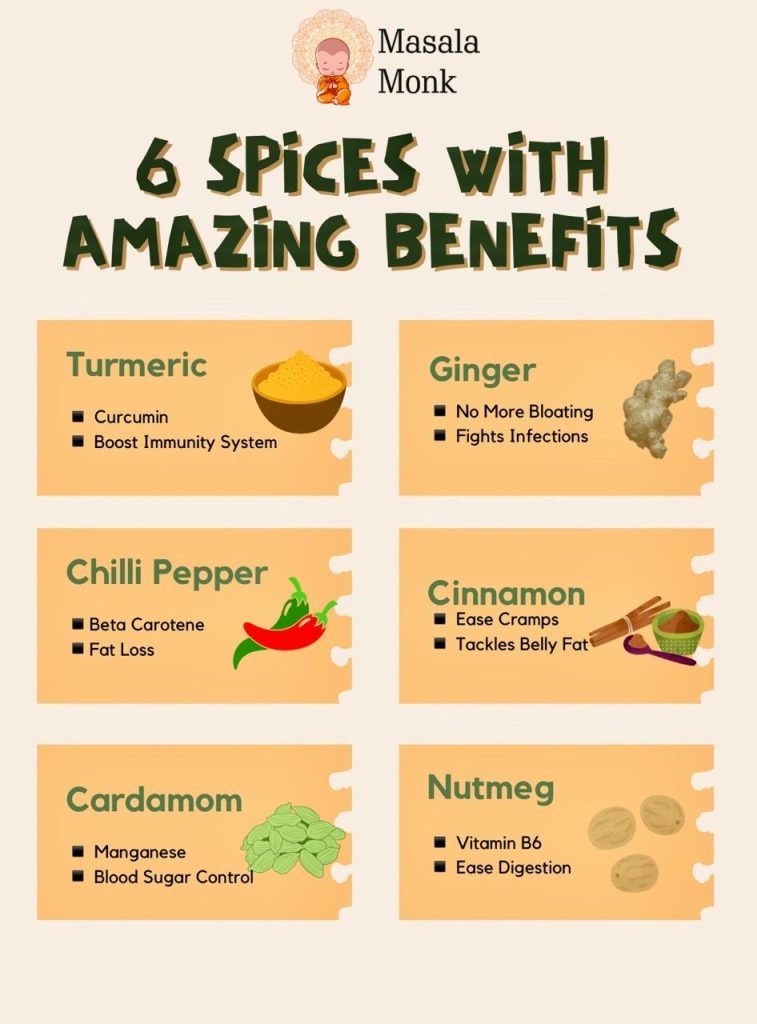
When we think of Indian cuisine, the first thing that often comes to mind is its explosion of colors, aromas, and flavors. But behind these vibrant dishes lies a centuries-old tradition of using spices not just for taste but also for their powerful health benefits.
Indian spices have been a cornerstone of Ayurvedic medicine and holistic health practices for millennia. Today, modern science is validating many of these traditional uses, making Indian spices an essential part of global wellness conversations.
In this article, we explore the powerful health benefits of six common Indian spices, their uses, and why you should consider incorporating them into your daily routine.
Why Indian Spices Are Healthy
Before we dive into our list, let’s address a common question:
Are Indian spices healthy? Are Indian spices good for you?
Absolutely. Indian spices are rich in bioactive compounds, antioxidants, anti-inflammatory agents, and essential nutrients. They support digestion, boost immunity, fight chronic diseases, and promote overall well-being. What makes them even more special is that they are easily accessible and simple to incorporate into everyday meals.
Now, let’s take a deep dive into the six super spices you should know about.
1. Turmeric (Haldi) — The Golden Healer
Key Compound: Curcumin
Turmeric is often called the “golden spice” of India — and for good reason. It contains curcumin, a powerful antioxidant and anti-inflammatory compound that has been widely studied for its health benefits.
Health Benefits:
- Anti-inflammatory powerhouse: Helps reduce chronic inflammation, which is linked to diseases like heart disease, cancer, and Alzheimer’s.
- Antioxidant effects: Neutralizes free radicals, reducing oxidative stress.
- Joint health: Alleviates symptoms of arthritis and joint pain.
- Brain function: May enhance cognitive function and protect against neurodegenerative diseases.
- Supports immune system: Strengthens the body’s natural defense mechanisms.
- Heart health: Helps maintain healthy blood pressure and cholesterol levels.
Traditional Uses:
- Curries, dals, rice dishes
- Golden milk (turmeric latte)
- Herbal teas and wellness shots
- Skin care remedies (face masks)
Pro Tip: Pair turmeric with black pepper to enhance curcumin absorption significantly.
2. Cumin (Jeera) — The Digestive Aid
Key Compounds: Thymol, Cuminaldehyde
Cumin seeds have been used for centuries to aid digestion and improve gut health.
Health Benefits:
- Digestive support: Stimulates the secretion of digestive enzymes, reducing bloating and indigestion.
- Blood sugar regulation: May help lower blood sugar levels.
- Weight management: Boosts metabolism and may aid in fat loss.
- Rich in iron: Supports hemoglobin production and combats anemia.
- Antimicrobial: Helps fight bacteria and parasites.
Traditional Uses:
- Tadka (tempering) in dals and curries
- Rice dishes like jeera rice
- Roasted snacks
- Herbal infusions (jeera water)
Pro Tip: Soak cumin seeds in water overnight and drink in the morning for digestive benefits.
3. Coriander (Dhaniya) — The Detoxifier
Key Compounds: Linalool, Quercetin
Both the seeds and leaves of coriander are widely used in Indian cooking, offering a fresh, citrusy flavor.
Health Benefits:
- Heart health: Lowers bad cholesterol (LDL) and increases good cholesterol (HDL).
- Antioxidant rich: Helps combat oxidative stress.
- Anti-inflammatory: Reduces inflammation in the body.
- Supports digestion: Relieves bloating and promotes gut health.
- Detoxification: Helps the body eliminate heavy metals and toxins.
- Antibacterial: Fights infections and supports oral health.
Traditional Uses:
- Curries and gravies
- Chutneys and sauces
- Garnishing salads, soups, and snacks
- Coriander seed tea for digestion
Pro Tip: Coriander seeds can be dry-roasted to enhance their flavor and medicinal properties.
4. Ginger (Adrak) — The Universal Remedy
Key Compounds: Gingerol, Shogaol
Ginger is a versatile spice known for its therapeutic effects across cultures.
Health Benefits:
- Anti-nausea: Effective against motion sickness, morning sickness, and nausea.
- Digestive aid: Stimulates digestion and relieves bloating.
- Anti-inflammatory: Reduces joint pain and muscle soreness.
- Boosts immunity: Helps ward off infections.
- Cardiovascular support: Improves blood circulation and heart health.
- May reduce cancer risk: Shown to inhibit the growth of certain cancer cells.
Traditional Uses:
- Masala chai (spiced tea)
- Curries and stir-fries
- Soups and broths
- Ginger shots and teas
Pro Tip: Fresh ginger juice with lemon and honey is an excellent natural remedy for colds.
5. Fenugreek (Methi) — The Hormone Balancer
Key Compounds: Saponins, Trigonelline
Fenugreek is a nutrient-dense spice often used for its hormone-balancing effects.
Health Benefits:
- Blood sugar control: Lowers blood glucose levels, beneficial for diabetics.
- Cholesterol reduction: Lowers LDL cholesterol and triglycerides.
- Supports lactation: Increases milk production in breastfeeding mothers.
- Digestive aid: Reduces constipation and bloating.
- Anti-inflammatory: Alleviates arthritis symptoms.
- Hormonal balance: May help manage symptoms of PCOS.
Traditional Uses:
- Curries and dals
- Methi paratha (flatbreads)
- Pickles
- Sprouted fenugreek salads
Pro Tip: Soak fenugreek seeds overnight and consume in the morning for metabolic benefits.
6. Black Pepper (Kali Mirch) — The Bioavailability Booster
Key Compound: Piperine
Black pepper, often called the “King of Spices,” not only adds heat to dishes but also enhances nutrient absorption.
Health Benefits:
- Enhances bioavailability: Increases the absorption of nutrients like curcumin from turmeric.
- Antioxidant effects: Fights oxidative stress.
- Gut health: Stimulates digestive enzymes.
- Respiratory support: Helps relieve congestion and respiratory issues.
- Anti-inflammatory: Reduces inflammation and supports joint health.
- Brain function: May help improve cognitive performance.
Traditional Uses:
- Spice blends like garam masala
- Soups, stews, and gravies
- Marinades and salad dressings
- Herbal teas with honey and ginger
Pro Tip: Add freshly ground black pepper at the end of cooking to preserve its health benefits.

How to Incorporate Indian Spices into Your Daily Routine
- Start your day with warm water infused with turmeric and black pepper.
- Use cumin and coriander in your everyday cooking.
- Add ginger to your morning tea or smoothies.
- Include fenugreek seeds in your salads or soak them overnight.
- Finish your meals with freshly ground black pepper.
Moderation is key: While these spices offer many benefits, excessive consumption can cause side effects. Always consult with a healthcare professional if you have any underlying health conditions.
Conclusion: The Timeless Power of Indian Spices
Indian spices are far more than culinary ingredients — they are nature’s pharmacy, offering a wide array of health benefits that have been recognized for generations. By incorporating these six common spices — turmeric, cumin, coriander, ginger, fenugreek, and black pepper — into your diet, you can enjoy delicious flavors while supporting your overall health and well-being.
The power of six is simple, accessible, and profoundly effective.
Start small, explore new recipes, and let the ancient wisdom of Indian spices enhance your modern lifestyle.
10 FAQs with Answers
1️⃣ What are the most common Indian spices?
The most common Indian spices include turmeric (haldi), cumin (jeera), coriander (dhaniya), ginger (adrak), fenugreek (methi), and black pepper (kali mirch). These spices are staples in most Indian kitchens and offer a range of health benefits.
2️⃣ How do Indian spices improve digestion?
Many Indian spices like cumin, coriander, ginger, and fenugreek stimulate digestive enzymes, reduce bloating, prevent gas formation, and improve nutrient absorption, thereby promoting healthy digestion.
3️⃣ Can I consume turmeric daily?
Yes, consuming turmeric daily in moderate amounts is generally safe and beneficial due to its anti-inflammatory and antioxidant properties. However, high doses should be taken under medical supervision, especially if you are on blood thinners or have gallbladder issues.
4️⃣ Which Indian spices help with immunity?
Turmeric, ginger, black pepper, and cumin are particularly known to boost immunity by reducing inflammation, fighting infections, and enhancing the body’s natural defense mechanisms.
5️⃣ Do Indian spices have side effects?
In moderation, Indian spices are safe for most people. Overconsumption may cause side effects like heartburn, digestive upset, or interact with certain medications. Always consult your healthcare provider if unsure.
6️⃣ Can Indian spices help with weight loss?
Yes. Spices like cumin, turmeric, and fenugreek can support metabolism, blood sugar control, and appetite regulation, which may assist in healthy weight management when combined with a balanced diet and exercise.
7️⃣ Are Indian spices suitable for people with diabetes?
Many Indian spices such as fenugreek, cumin, and turmeric help regulate blood sugar levels, making them beneficial for people managing diabetes. Always consult your doctor for personalized guidance.
8️⃣ How can I start using Indian spices if I’m new to them?
Start by adding small amounts of turmeric, cumin, or coriander to soups, stews, and rice. Ginger and black pepper can be added to teas or salads. Gradually experiment with traditional Indian recipes to get familiar with flavors.
9️⃣ Do Indian spices lose their benefits when cooked?
Some heat-sensitive compounds may degrade with prolonged cooking. To retain maximum benefits, add spices like black pepper towards the end of cooking, while others like cumin and turmeric can handle heat better.
🔟 Are Indian spices the same as masala?
Masala refers to a blend of multiple spices, while individual spices like turmeric, cumin, and coriander are the building blocks. Masala mixes can offer a combination of health benefits depending on their ingredients.









